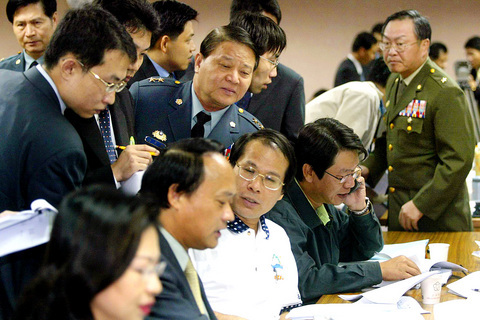The nation's top military leader said yesterday that the US has suspended military talks with Taiwan because of a contentious arms procurement deal that has been stalled in the legislature.
"The US informed us in writing that it would suspend an arms exchange meeting with Taiwan, and [the resumption of the meeting] depends on how the arms budget goes," Minister of National Defense Lee Jye (李傑) said.
Lee was answering a query from Democratic Progressive Party (DPP) Legislator Shan Fa-hui (沈發惠) during a meeting of the legislature's National Defense Committee.

PHOTO: LIN CHENG-KUN, TAIPEI TIMES
Later in the day, Ministry of National Defense Spokesman Admiral Wu Chi-fang (
Wu told the Taipei Times by telephone that an annual meeting in which officials from the ministry's Armaments Bureau travel to the US for exchanges with the US military had been suspended.
A ministry source, speaking on condition of anonymity, told the Liberty Times, (the Taipei Times' sister newspaper), that the ministry had tried to salvage the situation, but was told that the decision had been made by a high-ranking official in the White House.
A US defense source, also speaking on condition of anonymity, said he believed Lee's assertion that the talks had been suspended was a "slight exaggeration," and added that he was personally aware "of a number of ongoing dialogues."
During the meeting, Lee urged lawmakers to review the long-stalled arms procurement budget, but added that recent comments from American Institute in Taiwan Director Stephen Young had made it even harder to get the legislature to agree on the deal.
"His comments have left the situation in disarray and brought us to a deadlock, making the passage of the arms bill even more difficult," Lee said in response to a question from Chinese Nationalist Party (KMT) Legislator Lin Te-fu (林德福).
Young last Thursday called a press conference in which he urged the legislature to pass the bill by the end of this fall.
Pan-blue legislators lashed out at Young for his remarks again during yesterday's meeting.
"We don't oppose arms procurement as long as it is reasonable, but we will not pass the bill because of [Young's] threats and intimidation," Lin said.
People First Party (PFP) Legislator Chao Liang-yen (
"Taiwan is not a colony of the US, and our president is not the US' puppet emperor. What Young did was threaten legislators, and it was outrageous," Chao said.
Meanwhile, DPP Legislator Lee Wen-chung (李文忠) said that pan-blue leaders should take responsibility for the decline in US-Taiwan relations because of the delay.
"Former KMT chairman Lien Chan (
In related news, the legislature's Foreign and Overseas Chinese Affairs Committee passed a resolution asking the US Department of State to create measures restraining its diplomats' remarks in Taiwan, saying that Young's statement had violated diplomatic courtesy and could be interpreted as interference with Taiwan's internal affairs.
The resolution said that it was designed to prevent US diplomats from hurting the feelings of the people of Taiwan and harming Taiwan's democracy.
The resolution was proposed by KMT legislators Justin Chou (
DPP Legislator Huang Wei-cher (
Additional reporting by Mac William Bishop
also see story:
Editorial: Stephen Young plays the blues

The CIA has a message for Chinese government officials worried about their place in Chinese President Xi Jinping’s (習近平) government: Come work with us. The agency released two Mandarin-language videos on social media on Thursday inviting disgruntled officials to contact the CIA. The recruitment videos posted on YouTube and X racked up more than 5 million views combined in their first day. The outreach comes as CIA Director John Ratcliffe has vowed to boost the agency’s use of intelligence from human sources and its focus on China, which has recently targeted US officials with its own espionage operations. The videos are “aimed at

STEADFAST FRIEND: The bills encourage increased Taiwan-US engagement and address China’s distortion of UN Resolution 2758 to isolate Taiwan internationally The Presidential Office yesterday thanked the US House of Representatives for unanimously passing two Taiwan-related bills highlighting its solid support for Taiwan’s democracy and global participation, and for deepening bilateral relations. One of the bills, the Taiwan Assurance Implementation Act, requires the US Department of State to periodically review its guidelines for engagement with Taiwan, and report to the US Congress on the guidelines and plans to lift self-imposed limitations on US-Taiwan engagement. The other bill is the Taiwan International Solidarity Act, which clarifies that UN Resolution 2758 does not address the issue of the representation of Taiwan or its people in

SHIFT: Taiwan’s better-than-expected first-quarter GDP and signs of weakness in the US have driven global capital back to emerging markets, the central bank head said The central bank yesterday blamed market speculation for the steep rise in the local currency, and urged exporters and financial institutions to stay calm and stop panic sell-offs to avoid hurting their own profitability. The nation’s top monetary policymaker said that it would step in, if necessary, to maintain order and stability in the foreign exchange market. The remarks came as the NT dollar yesterday closed up NT$0.919 to NT$30.145 against the US dollar in Taipei trading, after rising as high as NT$29.59 in intraday trading. The local currency has surged 5.85 percent against the greenback over the past two sessions, central

US Indo-Pacific Commander Admiral Samuel Paparo on Friday expressed concern over the rate at which China is diversifying its military exercises, the Financial Times (FT) reported on Saturday. “The rates of change on the depth and breadth of their exercises is the one non-linear effect that I’ve seen in the last year that wakes me up at night or keeps me up at night,” Paparo was quoted by FT as saying while attending the annual Sedona Forum at the McCain Institute in Arizona. Paparo also expressed concern over the speed with which China was expanding its military. While the US